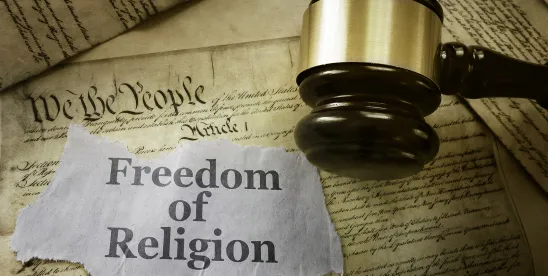Can a public school require students to engage with materials that conflict with their parents’ religious beliefs without offering an opt-out? In Mahmoud v. Taylor, the U.S. Supreme Court enjoined the Montgomery County public school system from using certain classroom materials without giving parents notice and an opportunity to have their children excused on religious free exercise grounds. While the decision specifically involved LGBTQ+ related material, the rationale of the decision would apply to virtually any curricular material which a parent perceives to be contrary to their fundamental religious beliefs.
Parents of several faiths challenged the school board’s policy of incorporating storybooks which depicted gay and trans individuals in a positive light. The parents asserted that their religious traditions prohibited gay relationships; consequently, the materials compromised their ability to inculcate their religious values in their children. Books, such as Uncle Bobby’s Wedding (attached in full as an appendix to the dissent) were introduced to the classroom as part of a district initiative to promote inclusivity.
Writing for a 6-3 majority, Justice Samuel Alito wrote that the curricular choice represented a “substantial threat” to the parents’ ability to control their children’s upbringing and thus was subject to “strict scrutiny,” which is the most demanding standard applicable in constitutional cases. The opinion relied heavily on Wisconsin v. Yoder, 406 U.S. 205 (1972), a case in which the court had overturned the criminal convictions of Amish parents who withdrew their children from school at an age younger than allowed by Wisconsin law. The withdrawal was in accordance with Amish belief and tradition requiring children of that age to assume roles in the religious community. Yoder found that it was impossible for the parents to comply with both the state law and the established dictates of their religion, and thus, the law impermissibly burdened the exercise of their faith. The Mahmoud case held that reading books with a positive portrayal of gay or transgendered individuals was an equivalent “threat” to the parents’ free exercise as that found in Yoder and therefore mandated the opt-out.
Key Takeaways:
- Parental Rights Strengthened: The decision greatly expands the constitutional right of parents to direct the religious upbringing of their children in public school settings where curricular materials may conflict with their beliefs.
- New Standard for Free Exercise Burdens: The Court’s test establishes that educational requirements posing a substantial risk to a parent’s ability to instill religious values trigger strict scrutiny, even if the policy is neutral and generally applicable.
- Opt-Out Requirement: Public schools should provide advance notice and opt-out options when using materials that conflict with parents’ religious beliefs, especially those with normative messages on sensitive topics like marriage, sexuality, and gender. In many cases, it may be difficult to determine which materials may require advance notice and the right to opt out.
- Limited Scope, Broad Implications: While the ruling specifically addresses LGBTQ+-inclusive storybooks, it applies to “any other similar book” used in instruction, potentially affecting a wide range of curricular materials that parents may find objectionable on religious grounds.
As schools navigate this new legal landscape, Mahmoud v. Taylor will likely shape debates over curriculum design and parental rights for years to come.








 />i
/>i
